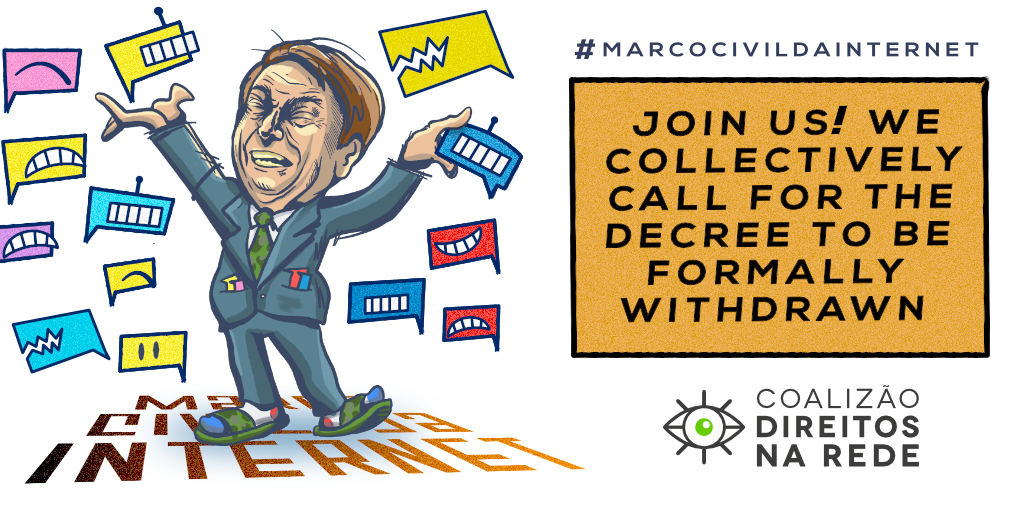
Concerning Draft Decree in Brazil threatens the Civil Rights Framework for the Internet
The undersigned academics, companies, and non-governmental organizations are deeply concerned about a recently proposed, draft Presidential Decree on freedom of expression and the Internet. Given the significant constitutional, due process, human rights, and jurisdictional concerns that it has generated, we collectively call for the Decree to be formally withdrawn.
In May 2021, the Brazilian Ministry of Tourism announced that the Executive branch was working on a Presidential Decree on the right to freedom of expression and the internet. According to President Bolsonaro, Internet application providers have been abusing their content moderation mechanisms and are engaging in censorship of legal speech. The initiative follows a series of draft bills proposed in both houses that would prevent social media platforms from removing or in any way restricting accounts and content deemed to violate their policies.
The Civil Rights Framework for the Internet (“Marco Civil”), the benchmark intermediary liability legislation passed into law in 2014, does not address the activity of content moderation itself. Rather, it addresses liability pertaining to user-generated content by clarifying that intermediaries can only be held liable if they fail to comply with a court order requiring certain content to be removed, and establishing limited exceptions for intermediaries’ dissemination of non-consensual intimate images and copyright.
JOIN US!
New subscriptions will be updated every morning.
According to a draft, the Decree would, with limited exceptions, prohibit intermediaries from removing, suspending, or restricting content or removing, cancelling, or suspending accounts on their services without a court order. The Decree assigns enforcement responsibilities to National Secretariat of Copyright and Intellectual Property, apparently on the theory that content moderation decisions would violate users’ intellectual property. The Decree also provides that noncompliance will subject companies to penalties established in Marco Civil, notwithstanding the fact that the law specifies those penalties as applicable only for violations of data protection and data retention requirements (and even then, suspensions or bans are limited to data processing operations violating those requirements, and do not extend to other activity by the provider).
The Decree would radically change the regulatory landscape for internet applications in Brazil. By effectively overriding Marco Civil via Executive fiat and clearly bypassing the National Congress, the draft Decree appears to be ultra vires and unconstitutional. In addition, the Bolsonaro administration does not appear to have consulted on the Decree with relevant bodies, including the Brazilian Internet Steering Committee (CGI) – as required by law. By substantially restraining the ability of intermediaries to quickly address clear violations of their terms of service, including for hate speech, extremist content, and disinformation, the Decree would fundamentally reshape the digital content environment in Brazil in ways that would be likely to significantly infringe upon users’ freedom of opinion and expression. It would also considerably impact people from marginalized backgrounds, who are disproportionately targeted by hate speech, online harassment, and disinformation, which all too often result in offline harm. Furthermore, lack of clarity around the territorial scope of the Decree could have spillover effects on content moderation outside of Brazil, which would negatively impact freedom of expression extraterritorially and potentially create conflicts-of-law in other jurisdictions.
For these reasons, the undersigned organizations call upon the Bolsonaro administration to refrain from issuing the Decree and instead engage in a meaningful, transparent dialogue with the CGI, Congress, intermediaries, and civil society, to consider the most appropriate ways to address legitimate concerns about content moderation in a manner consistent with Brazil’s international human rights obligations, Constitution, and Marco Civil.
Sincerely,
Access Now
Berkman Klein Center for Internet & Society at Harvard University – Jessica Fjeld
Coalizão Direitos na Rede
Dangerous Speech Project
Derechos Digitales · América Latina
Domini Impact Investments LLC
Fundación InternetBolivia.org
Global Network Initiative
Hiperderecho
Idec – Instituto Brasileiro de Defesa do Consumidor
Instituto Beta: Internet & Democracia
Instituto para la Sociedad de la Información y Cuarta Revolución Industrial
Ranking Digital Rights
SFLC.in
TEDIC
Unwanted Witness
Wikimedia Foundation
Women of Uganda Network
